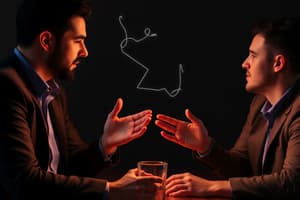Podcast
Questions and Answers
What can be a direct form of punishment in a business setting?
What can be a direct form of punishment in a business setting?
- Being given a promotion
- Being sacked (correct)
- Getting more responsibilities
- Receiving a raise
What does 'prevention' in a business context primarily involve?
What does 'prevention' in a business context primarily involve?
- Providing excessive guidance to employees
- Offering rewards for good performance
- Creating competitive teams among employees
- Withholding something to compel desired behavior (correct)
What is the primary focus of the competency stated in the document?
What is the primary focus of the competency stated in the document?
- Discuss the history of Philippine politics
- Evaluate the structure of government
- Analyze the nature, dimension/types, and consequences of power (correct)
- Assess the role of citizens in governance
When power is used, what can sometimes be a negative consequence for the person wielding it?
When power is used, what can sometimes be a negative consequence for the person wielding it?
Which of the following best describes the type of content highlighted in the provided references?
Which of the following best describes the type of content highlighted in the provided references?
In a business context, which role is often seen as a 'gateway' role that involves withholding access to someone in power?
In a business context, which role is often seen as a 'gateway' role that involves withholding access to someone in power?
Which type of governance might the analysis of power consequences be related to?
Which type of governance might the analysis of power consequences be related to?
What is one possible outcome when power is exercised over someone who has previously been helped?
What is one possible outcome when power is exercised over someone who has previously been helped?
What could be considered a consequence of power in a political context?
What could be considered a consequence of power in a political context?
Why might someone experience a power loss after using their influence?
Why might someone experience a power loss after using their influence?
How might the nature of power differ in various political systems?
How might the nature of power differ in various political systems?
What is the nature of the transaction involved in the prevention concept?
What is the nature of the transaction involved in the prevention concept?
Which of the following reflects a positive consequence of using power effectively?
Which of the following reflects a positive consequence of using power effectively?
In analyzing power types, which aspect is least likely to be considered?
In analyzing power types, which aspect is least likely to be considered?
What would be a likely outcome of effective governance in terms of power distribution?
What would be a likely outcome of effective governance in terms of power distribution?
Which factor can significantly influence an individual's power according to the referenced studies?
Which factor can significantly influence an individual's power according to the referenced studies?
What does 'power with' refer to?
What does 'power with' refer to?
Which dimension of power is characterized by the use of money or force to achieve an outcome?
Which dimension of power is characterized by the use of money or force to achieve an outcome?
What is a consequence of the second dimension of power?
What is a consequence of the second dimension of power?
Coercive power primarily operates through which of the following means?
Coercive power primarily operates through which of the following means?
What defines the fourth dimension of power?
What defines the fourth dimension of power?
What is the standard theory of power as discussed in the content?
What is the standard theory of power as discussed in the content?
In the context of different types of power, what is a key characteristic of coercive power?
In the context of different types of power, what is a key characteristic of coercive power?
According to the content, who discussed the idea that power is fundamental in social science?
According to the content, who discussed the idea that power is fundamental in social science?
How does the third dimension of power generally operate?
How does the third dimension of power generally operate?
What is an important distinction to understand when studying power?
What is an important distinction to understand when studying power?
Which of the following best defines 'power-over'?
Which of the following best defines 'power-over'?
What does 'power-to' refer to?
What does 'power-to' refer to?
How is power generally perceived in everyday speech?
How is power generally perceived in everyday speech?
Which statement best describes the expanded definition of power according to Rees?
Which statement best describes the expanded definition of power according to Rees?
What condition does Hobbes refer to when there is no common power among men?
What condition does Hobbes refer to when there is no common power among men?
What is a key characteristic of a world without power, as discussed in the content?
What is a key characteristic of a world without power, as discussed in the content?
Which statement does not accurately describe the nature of power?
Which statement does not accurately describe the nature of power?
What is the ability to do something on one's own referred to as?
What is the ability to do something on one's own referred to as?
What type of power is associated with being respected due to skills and knowledge?
What type of power is associated with being respected due to skills and knowledge?
Which transaction best illustrates the concept of compliance through threat of punishment?
Which transaction best illustrates the concept of compliance through threat of punishment?
According to Following Allen, which power primarily relies on force and threat?
According to Following Allen, which power primarily relies on force and threat?
Which scenario is likely to result in power loss?
Which scenario is likely to result in power loss?
The statement 'a world without power would be a world without the agency to do things' suggests that:
The statement 'a world without power would be a world without the agency to do things' suggests that:
What types of power is Glenn exercising when he threatens employees with termination for not increasing sales?
What types of power is Glenn exercising when he threatens employees with termination for not increasing sales?
Flashcards are hidden until you start studying
Study Notes
Nature of Power
- Power is an essential aspect of human social relations and structures, often defined as the capacity to influence outcomes through control of valued resources.
- Thomas Hobbes emphasized that without a common authority, humans exist in a state of war against one another.
- Bertrand Russell compared power in social science to energy in physics, suggesting it's a fundamental concept for agency and action.
- Types of power include:
- Power-over: Dominance over others through force or coercion.
- Power-to: Individual capacity to achieve goals based on personal attributes, resources, or skills.
- Power-with: Collaborative efforts to achieve results through cooperation among individuals.
Dimensions/Types of Power
- First Dimension of Power: Direct power, often exercised through money or physical force, where only the powerful influence decisions.
- Second Dimension of Power: Enables understanding of cause and effect, allowing for informed decision-making that can favor weaker parties.
- Third Dimension of Power: Avoidance of conflict via manipulation, leading to feelings of helplessness among the less fortunate.
- Fourth Dimension of Power: Combines elements of the previous dimensions, focusing on social conventions and their establishment.
Types of Power
- Coercive Power: Imposed by authority threatening punishment to ensure compliance.
- Preventive Power: Withholding cooperation or benefits to compel actions, often seen in roles that control access to decision-makers.
- Consequences of using power can vary:
- Power Gain: Increased compliance and perceived authority over subordinates.
- Power Loss: Diminished influence over individuals once they feel obligated to reciprocate help.
Positive and Negative Consequences of Power
- Examples include positive outcomes like strengthened relationships through collaboration or negative impacts such as resentment and resistance due to coercive tactics.
Assessment Examples
- Assessment questions focus on key concepts like Hobbes' perspective on power, types of power, and real-world implications of power dynamics in various scenarios.
Studying That Suits You
Use AI to generate personalized quizzes and flashcards to suit your learning preferences.



